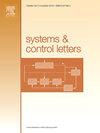一类双曲偏微分方程的Riccati方程和lq -最优控制
IF 2.5
3区 计算机科学
Q3 AUTOMATION & CONTROL SYSTEMS
引用次数: 0
摘要
本文给出了一类边界控制双曲型偏微分方程线性二次最优控制问题的算子Riccati方程的显式解。使用不同的系统描述来获得算子Riccati方程的不同表示。通过一个例子,我们说明了考虑扩展算子Riccati方程来解决这类系统的lq -最优控制问题的重要性。本文章由计算机程序翻译,如有差异,请以英文原文为准。
Riccati equations and LQ-optimal control for a class of hyperbolic PDEs
We derive an explicit solution to the operator Riccati equation solving the Linear–Quadratic (LQ) optimal control problem for a class of boundary controlled hyperbolic partial differential equations (PDEs) defined on a one-dimensional spatial domain. Different descriptions of the system are used to obtain different representations of the operator Riccati equation. By means of an example, we illustrate the importance of considering an extended operator Riccati equation to solve the LQ-optimal control problem for our class of systems.
求助全文
通过发布文献求助,成功后即可免费获取论文全文。
去求助
来源期刊

Systems & Control Letters
工程技术-运筹学与管理科学
CiteScore
4.60
自引率
3.80%
发文量
144
审稿时长
6 months
期刊介绍:
Founded in 1981 by two of the pre-eminent control theorists, Roger Brockett and Jan Willems, Systems & Control Letters is one of the leading journals in the field of control theory. The aim of the journal is to allow dissemination of relatively concise but highly original contributions whose high initial quality enables a relatively rapid review process. All aspects of the fields of systems and control are covered, especially mathematically-oriented and theoretical papers that have a clear relevance to engineering, physical and biological sciences, and even economics. Application-oriented papers with sophisticated and rigorous mathematical elements are also welcome.
 求助内容:
求助内容: 应助结果提醒方式:
应助结果提醒方式:


